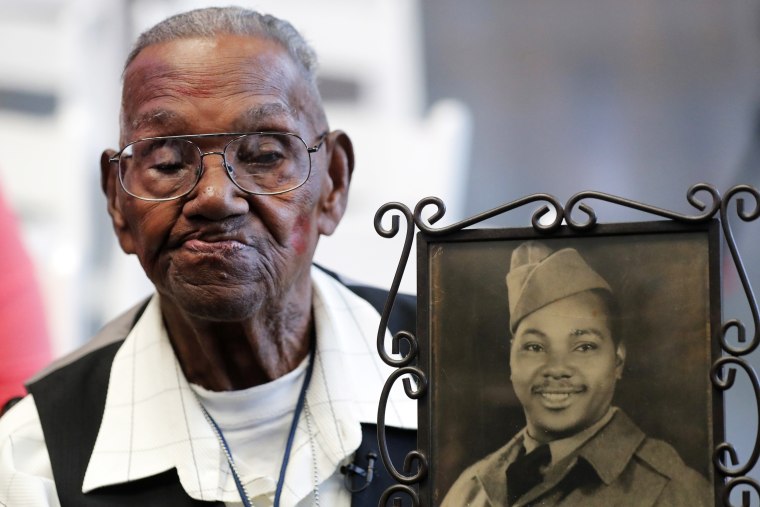The country's oldest surviving World War II veteran, Lawrence Brooks, died Wednesday at the age of 112, according to the National WWII Museum in New Orleans.
Brooks, a Louisiana native and resident, was drafted in 1940 and served in the Army's 91st Engineer Battalion. His battalion was a predominately Black group of servicemen, due to the military's segregation practices at the time.
Stephen J. Watson, president and CEO of the National WWII Museum, called Brooks a man of great faith and "gentle spirit."
"As the nation’s oldest known living veteran, he proudly served our country during World War II, and returned home to serve his community and church," Watson said. "His kindness, smile and sense of humor connected him to generations of people who loved and admired him."
Louisiana Gov. John Bel Edwards offered condolences in a statement on Twitter. "I am sorry to hear of the passing of Mr. Lawrence Brooks, America’s oldest World War II veteran and a proud Louisianan," Edwards said Wednesday. "I am thankful I had the chance to meet him and learn from his service."
Born in a small village outside of Baton Rouge, Brooks was one of 15 children. His parents were sharecroppers who moved to Mississippi to find work after the Great Depression, according to the Army Times.
He was initially discharged and returned to New Orleans in November 1941 after his obligatory year of service, but rejoined the Army following the attack on Pearl Harbor weeks later.
Brooks served overseas in Australia, New Guinea and the Philippines, earning his way to private first class. He once shared the story of a harrowing journey on a C-47 going from Australia to New Guinea when an engine failed.
The crew began unloading cargo to make the plane lighter, Brooks said, and he moved toward the cockpit.
"You have a pilot and a co-pilot, only two of them, they're the only two who have a parachute," Brooks said. "I said if they run and jump, I'm gonna grab one of them."
At the end of his service, Brooks returned home to the racism of the Jim Crow era. He rarely talked about these issues with his fellow soldiers, saying it would just anger him, according to the museum's biography.
“I was treated so much better in Australia than I was by my own white people," Brooks once said. "I wondered about that.”
Brooks was denied GI Bill benefits, his daughter, Vanessa Brooks, said in recent interviews supporting a proposed congressional bill that would target racial inequities in the bill's provisions. Her father had always wanted to go to college, but without the bill — which includes tuition benefits — he wasn't able to after the war.
"It's too late for him, but he wants me to go to school and I want to go to Tulane, but it's just a dream," she told CBS News last month. "If the G.I. Bill is revived, I'll have the opportunity to go back to school on my daddy's shoulders."
Instead, Brooks fell back into civilian life as a forklift operator until retiring his 70s. His wife, Leona, died in 2008. He is survived by five children, 13 grandchildren and 32 great-grandchildren.
Over the years, Brooks has been celebrated as one of the oldest surviving WWII veterans. The National WWII Museum has hosted birthday parties for him for the past seven years.
The parties shifted to drive-by events at his New Orleans home in 2020 and 2021 because of the pandemic. The museum also started a birthday card writing campaign for Brooks in 2020, which it said generated 21,500 cards from nearly 30 countries.
